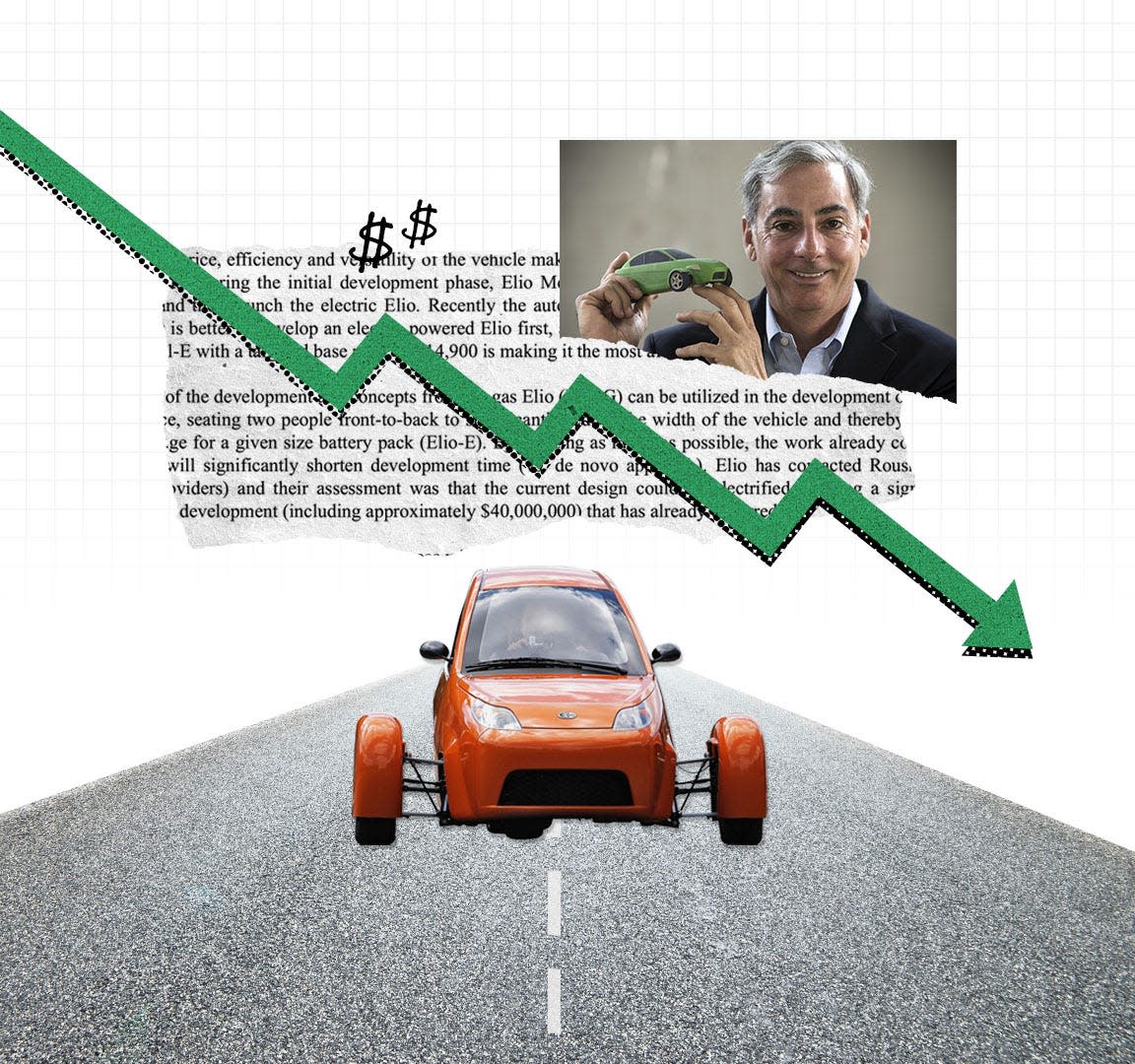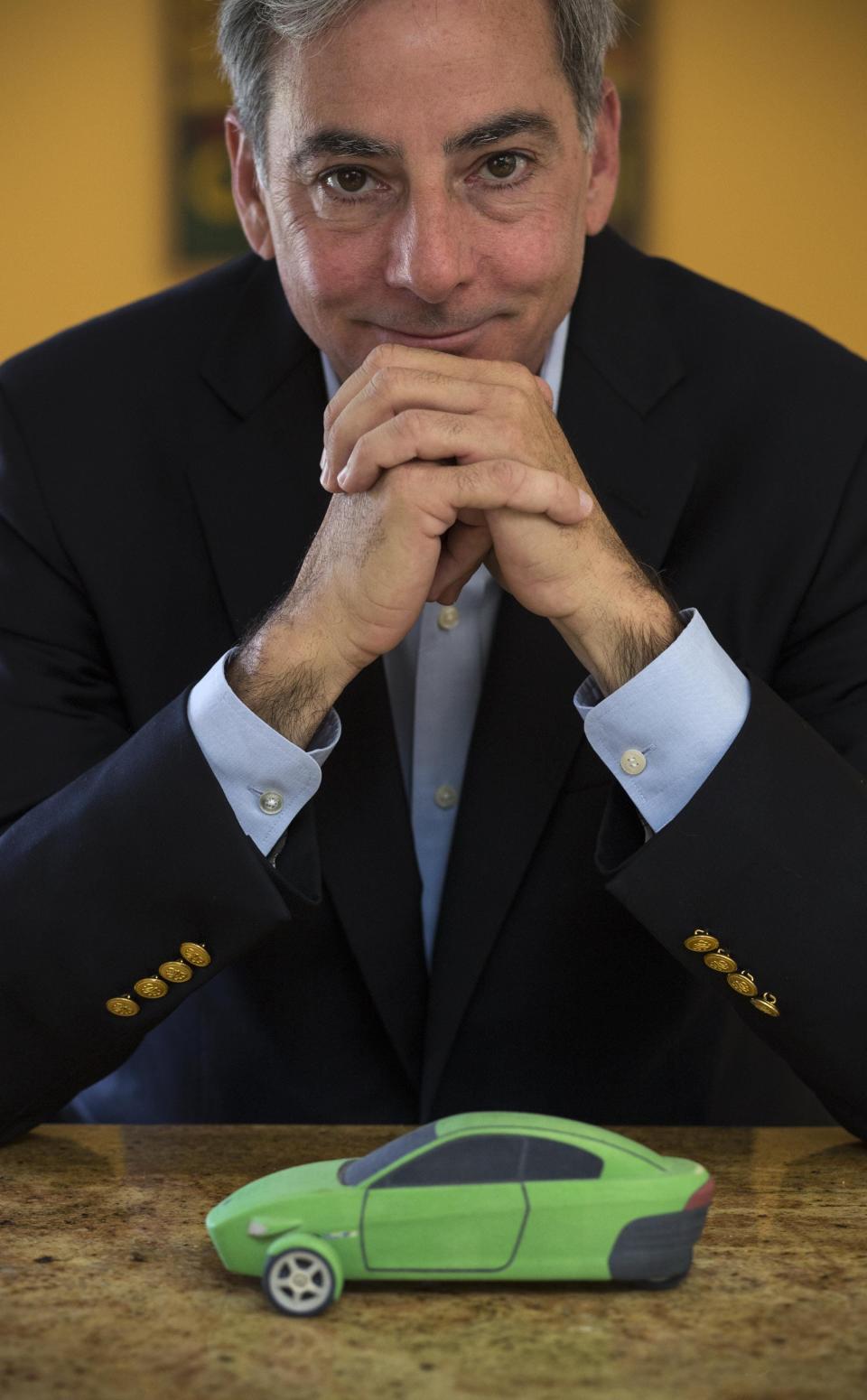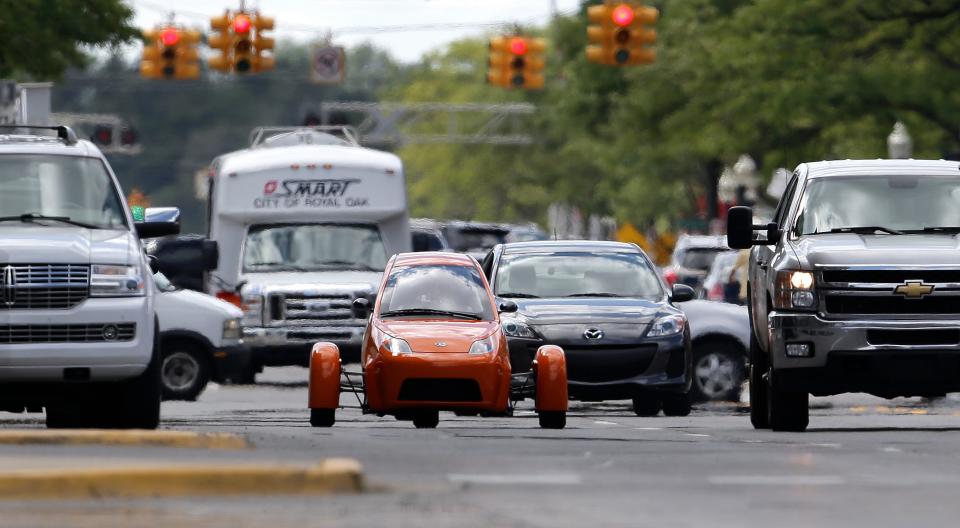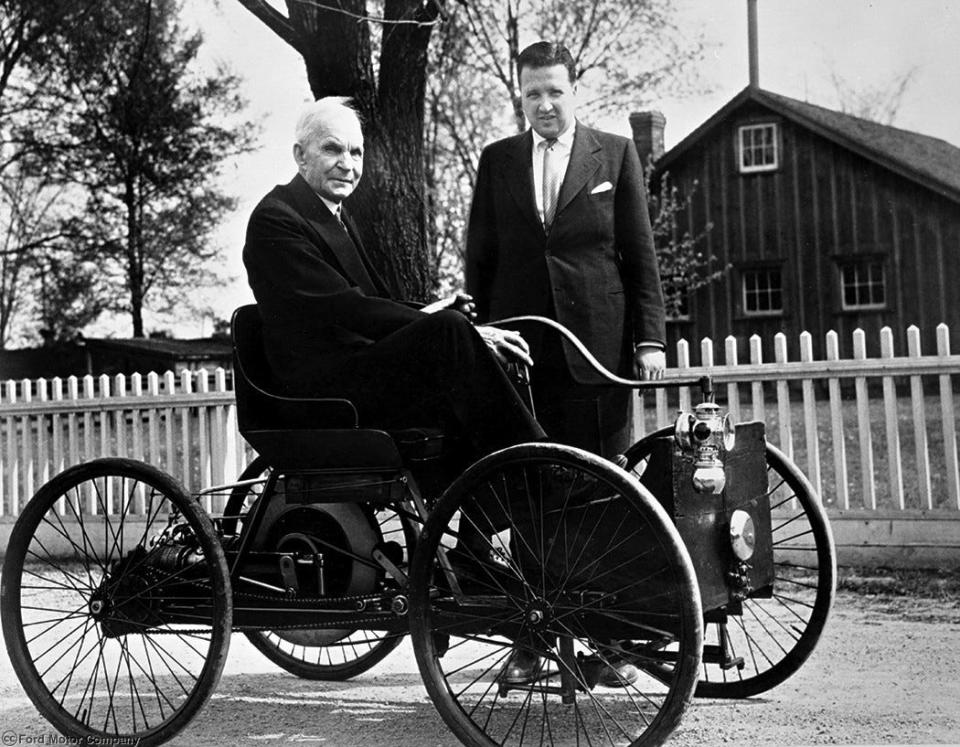‘The next Henry Ford’ raised millions to build a $7,000 car. His company still bled cash.

PHOENIX – When the Great Recession erupted in 2008, it ensnared automotive companies far and wide, including Paul Elio's.
General Motors and Chrysler filed for bankruptcy protection, backed by the U.S. government. So did many suppliers, as spending on automotive services evaporated when automakers cut costs in a bid to survive the global financial crisis.
Elio’s automotive company, ESG Engineering, which helped automakers develop new vehicle features, was totaled in the pileup.
Elio, by his own account, quickly fell on hard times when his company collapsed. The Phoenix engineer-entrepreneur was desperate for cash.
“It tanked rapidly,” he told USA TODAY. “And I'm not the only business that went out of business in ‘09.”

Elio said he took a job making $13 an hour for a time, but that it wasn’t enough to pay his personal bills.
By fall 2009, he had settled on a plan to get back on his feet.
At ESG Engineering, he figured that after gas prices topped $4 per gallon by summer 2008, Americans wanted something different from the vehicles made by Detroit automakers, known at the time for its gas-guzzling trucks and SUVs.
That's when he designed and invested $5 million in the development of the Elio, his three-wheeled vehicle named after himself.
In October 2009, he began pursuing his dream of developing an 84 mpg, two-seat car priced at less than $7,000 with his new company: Elio Motors.
Around that time, some of Paul Elio’s creditors began suing him, alleging he owed hundreds of thousands of dollars in unpaid debts.
In May 2010, Arizona Bank & Trust sued him in Maricopa County Superior Court in Phoenix, claiming that he defaulted on three loans totaling more than $819,000, records show.
Five months later, in October, Judge Benjamin E. Vatz issued a “default order” after Elio failed to respond to the suit or defend himself. That same month, he got divorced from his wife, Courtney, according to court records.
Discovery Bank, in January 2011, also sued Elio in Maricopa County Superior Court, alleging that he failed to pay more than $11,500 in credit card debt. He defended himself, and an arbitrator ruled against him.
At the time, he told USA TODAY for this story, he “was just trying to keep my kids fed and live indoors.”
But even though his personal finances were rocky, his business started to take off.
Elio Motors announced in December 2012 that it had completed the design on its initial vehicle and revealed the prototype in January 2013 at a news conference near Shreveport, Louisiana, where the company had negotiated a deal to take over a former GM site.
The Revitalizing Auto Communities Environmental Response (RACER) Trust, which had been established in the wake of the GM bankruptcy to find new uses for the automaker’s old properties, hailed the deal as a boon to the Louisiana economy.
Elio was promising 1,500 manufacturing jobs amid a sluggish economic rebound following the Great Recession.
The company scored an interview on CNBC, marking the first occasion of high-profile media interest that would continue for years, including stories or interviews in The New York Times, CNN, USA TODAY, the Detroit Free Press and Automotive News.
That publicity turned out to be a significant catalyst of interest in the company, casting a spotlight on Elio Motors for otherwise unaware Americans who began flooding to its website, interested in buying the vehicle.
At the same time it revealed its prototype, Elio began accepting reservations – a tactic that was being used by Tesla to demonstrate interest in its products, with one key exception: Most of the deposits placed for the Elio car were nonrefundable, according to Elio filings with the Securities and Exchange Commission, unlike Tesla’s refundable deposits.
Over the years, “all-in” depositors were promised an Elio T-shirt, a discount of $1,500 off the final price of the vehicle and a confirmed spot in line to take delivery when it was ready.
It was the start of a string of alternative ways of raising money. In addition to the deposits, Paul Elio:
Raised investment funds through a crowdfunding effort weeks after such a process was legalized.
Secured investments and loans from real estate investor Stuart Lichter, who also arranged a complex deal to help Elio obtain access to the former GM plant in Louisiana, which housed millions of dollars in equipment it would eventually put up for sale.
Announced plans to launch a cryptocurrency called ElioCoin to raise money for vehicle production.
Applied for a federal government loan from a program that had helped Ford and Tesla advance their energy-efficient vehicles.
Pursued an Elio-branded credit card.
Help us investigate Elio Motors
Did you place a deposit on an Elio vehicle or invest in the company? We want to hear from you.
The most successful of those efforts was the pursuit of reservations. They rolled in continuously via Elio Motors' website over the course of several years, beginning in January 2013.
By 2017, the company had more than 65,000 deposits of up to $1,000 each, most of them nonrefundable.
The company’s income has dried up in recent years as it’s become more clear that Elio has not established a viable path to production.
But in early September 2021, Elio emerged from nearly three years of silence, announcing that it plans to pivot from a gas-powered car to an electric vehicle priced at about $15,000.
The move comes amid questions about the legitimacy of multiple electric vehicle startups, including hydrogen semi-truck maker Nikola and electric pickup maker Lordstown Motors, which have faced accusations by investors of making fraudulent claims about their orders and technology, respectively.

Dave Cole, chairman emeritus of the Center for Automotive Research, a nonprofit that tracks the auto industry, said Elio promised more than it could ever manage to deliver.
“Now in the current era with all of the EVs, we're probably going to see a bunch of similar kinds of things – companies that say they're going to change the world and can't," he said.
But Paul Elio believes that a surge of interest in EV startups could finally deliver the funding he needs to make his company successful after years of trying to convince major investors to make an old-school, gas-powered vehicle.
“We have a really good design. We have the who’s-who of the global supply base backing us. We’ve got the plant,” he said, hinting at past announcements about automotive suppliers such as Bosch, Roush and Aisin.
“We’re finally in an area where people are investing, and that's always been the problem is finding the money.”
Reservations roll in
For a while, it looked like money might not be a problem at all.
By April 2013, only three months after beginning to accept deposits of up to $1,000, the company already had 1,000 reservations.
One month earlier, Paul Elio paid off his $819,000 debt to Arizona Bank & Trust, according to court records.
“Yeah, there was some financial mess, and I cleaned it all up,” he told USA TODAY for this story. “I didn’t go bankrupt. I owed over a million dollars between everybody. … I didn’t claim bankruptcy and I ultimately paid everybody back.”
Elio said he didn’t use cash from customers or investors to pay off his personal bills.
“That was all cleaned up before anybody outside got involved,” Elio said.
Later, however, he would again run into financial trouble.
But in the meantime, reservations continued to roll in. By February 2014, the number had risen to 10,000. Production, the company said at the time, was slated to begin in the fourth quarter of 2014.

In April 2014, it outlined a plan to send Elio vehicles to Pep Boys locations for vehicle service after production and deliveries were underway. A few months later, the company applied for a loan of $185 million from the Department of Energy’s Advanced Technology Vehicles Manufacturing (ATVM) Loan Program, promising to use the funds to bring the Elio vehicle to fruition.
Two months later, the company had 20,000 reservations.
“Elio is not a fling. It is not a novelty,” the company said on its website in 2014, according to archived versions reviewed by USA TODAY. “It is the product of a mobile society naturally evolving to a more efficient and practical form of transportation.”
Elio told the world that his company was in good shape.
“We are currently working on several financial strategies, and are confident funding will be secured,” he said in a news release in January 2015.
James Ledingham, an entrepreneur in Casa Grande, Arizona, and his wife joined the ranks of new Elio depositors, placing their $1,000 reservation in 2014. At the time, Ledingham was commuting 40 miles each way to work and was desperate for a vehicle with good gas mileage.
“Everything that I had heard up until that time was that we could expect it next year,” said Ledingham, 49. “Then it all changed.”

While it appeared to depositors that the company was inching close to production, they could not have known that Elio Motors was bleeding cash.
The company had posted a net loss of $24.6 million in 2014 with only about $375,000 cash on hand.
In hindsight, Ledingham questions whether the company’s fuel economy estimate and pricing were ever realistic.
“I think the announcements they made were a little bit more optimistic than what they should have been,” Ledingham said.
Raising money from small-time investors
Americans continued to reserve the Elio car after readers of tech site CNET named the Elio as the product they most wanted from the 2015 Consumer Electronics Show. At that point, Elio said it was "now targeting production (in the) first half of 2016."
The company reached 45,000 reservations by July 2015.
Sometime that year, Paul Elio tapped his company for financial help. It loaned him about $253,000 at an interest rate of less than 0.6%, according to public filings.
Around the same time, Elio identified a new avenue for funding his company.
Elio Motors announced in June 2015 that it would launch a crowdfunding investment campaign via a new route to be authorized in October 2015 by the SEC. That option was made possible by the JOBS Act signed into law by President Barack Obama that eased securities laws to encourage private funding of small businesses.
Elio initiated a stock sale to individual investors, advertising the campaign via StartEngine.com. He was taking advantage of an alternative to traditional financing. That new route was designed to help startups secure funding for the first time from “non-accredited” investors, who have less than $1 million in assets and less than $200,000 in annual income.
In materials posted to StartEngine.com, Elio Motors compared Paul Elio to the founder of Ford Motor Co., maker of the revolutionary Model T. Lichter even said Elio could be "the next Henry Ford."

“Henry Ford built his first gasoline-powered horseless carriage, the Quadricycle, in the shed behind his home. Five years later, he founded the Ford Motor Company,” the company said. “Today, there’s a new trailblazer working tirelessly to alter the course of history. His name is Paul Elio and this is the public’s first opportunity to invest in Elio Motors at the ground level.”
Laura Anthony is an attorney who said she advised Elio consultants on technical aspects of the crowdfunding offering. She said she identified immediately that the startup's projections were overly optimistic based on its public filings.
They resembled the projections of an established automaker like Toyota, she said, not the realities of an upstart company facing massive hurdles to reach production.
“Right away I was like, ‘This is just insane,’” she said. “It’s ridiculous.”
But investors’ attention at the time was on the November 2015 debut of what Elio called its “fifth-generation prototype” at the Los Angeles Auto Show, featuring an engine developed in partnership with IAV and a transmission made by Aisin, two automotive suppliers.
One of a kind. #Elio Keep up with our story on http://t.co/tn9nM78cyt pic.twitter.com/sWUq3OYdli
— Elio Motors (@ElioMotors) September 22, 2014
Elio Motors said production would begin in “late 2016” and then announced that German automotive supplier Bosch had agreed to make powertrain and safety components for the vehicle.
As momentum built, the stock sale was a hit, totaling nearly $16 million in proceeds that would enable the company’s development.
“We’ll make it,” Jerome Vassallo, vice president of sales, told a Detroit News columnist at the 2016 North American International Auto Show. The crowdfunding stock sale “put us over the hump,” he added.
Jim Mischel of Round Rock, Texas, was among the people who bought stock. He paid $20 a share.
Today, it’s worth less than $1.
The software engineer also placed a $1,000 nonrefundable deposit, saying he “knew exactly what I was doing” in the sense that he wouldn’t get his money back if Elio didn’t work out.
At the time, he was hoping to use it as his commuter car.
“My personal opinion is that Paul Elio and his crew are really trying to do something,” he said. “They’re not stringing people along. I actually think that they’re honest people trying to make a product.”
IRS sets sights on Paul Elio
At the same time Elio Motors' stock sale was underway, the IRS was going after its founder.
When investors began handing over money, Paul Elio was in arrears on his taxes.
In November 2015, the IRS filed a $99,000 lien against him in Maricopa County Superior Court for allegedly not paying federal income taxes in 2012 and 2013.
That period of unpaid taxes was not long after his engineering company had collapsed, leading him to the precipice of financial ruin.
But his new company’s fundraising efforts were soon to reverse his fortunes, making him rich, at least on paper.
In the quarter ended March 31, 2016, Elio's common stock, which was not listed on a major stock exchange and traded under the symbol “ELIO,” hit a high of $75. At that level, Elio was briefly worth hundreds of millions of dollars.
A look at E-series unveiling at #Elio Motors Pilot Operations Center among an audience of 250 media & key suppliers: pic.twitter.com/Drgsc94q86
— Elio Motors (@ElioMotors) June 30, 2016
By May 2016, he had repaid the principal and interest on the loan his company made to him. And the same month, the IRS released the lien against him, indicating he had paid his tax debt, records show.
That spring, the company announced it had established a pilot operations center in Livonia, Michigan, to manufacture vehicles under the leadership of former Chrysler executive Gino Raffin, who was in charge of product launches.
“A lot of effort went out,” Raffin told USA TODAY. “It's been a long road.”
All the while, the company was losing money rapidly, posting a net loss of $52.7 million in 2016 and leaving it with cash on hand of $120,000 to go along with $30 million in secured loans, including a note owed to the RACER Trust, which had predicated its deal on actual job creation.
The company’s spending went largely to suppliers for the development of components such as the vehicle’s engine, according to Paul Elio.
'We have significant progress and it WILL be unveiled soon." - @paul_elio on the P5 #ElioLiveStream pic.twitter.com/TpUDiwZYE6
— Elio Motors (@ElioMotors) September 10, 2015
Elio Motors said in a 2017 public filing that it funded its operations in 2016 “primarily through the receipt of customer reservations” and “the release of restricted cash held in customer deposits.”
Despite Vassallo, vice president of sales, saying less than a year earlier that the company had gotten “over the hump” financially, Elio Motors estimated in the public filing that as of the end of 2016, it needed to raise more than $376 million in additional funding “to reach cashflow positive.”
Vassallo could not be reached for comment for this story.
That year, Paul Elio earned a salary of $250,000, far less than the bosses of major automakers.
By March 2017, the company had topped 65,000 reservations, totaling $26.55 million in nonrefundable cash and $1.23 million in refundable deposits, according to an SEC filing.
Those deposits represent a credible interest in the company’s product, Elio told USA TODAY.
“You can do surveys, and a lot of people say they'll do something, but they won't. But when people put money down, that's a whole ‘nother level of engagement,” he said. “And so we, I believe, have demonstrated that this configuration of front-to-back seating and three wheels can sell in meaningful volumes.”
In 2018, Elio Motors in its annual report said $63.3 million had been invested in vehicle engineering and development, but the company would need more than a half-billion-dollar budget to succeed.
In Louisiana, local officials feel burned by Paul Elio, saying his promises haven't added up.
"This has gone on for a decade, and as you are aware, he has not produced a vehicle or a job," said Shreveport Economic Development Director Drew Mouton. "It's been a point of angst for us."
USA TODAY's Nathan Bomey reported from Arlington, Virginia, and Craig Harris from Phoenix. You can follow them on Twitter @NathanBomey and @CraigHarrisUSAT. You can also subscribe to our free Daily Money newsletter here for personal finance tips and business news every Monday through Friday morning.
More in this series
This article originally appeared on USA TODAY: Paul Elio raised millions to build cars. His company still bled cash

 Yahoo Movies
Yahoo Movies 
